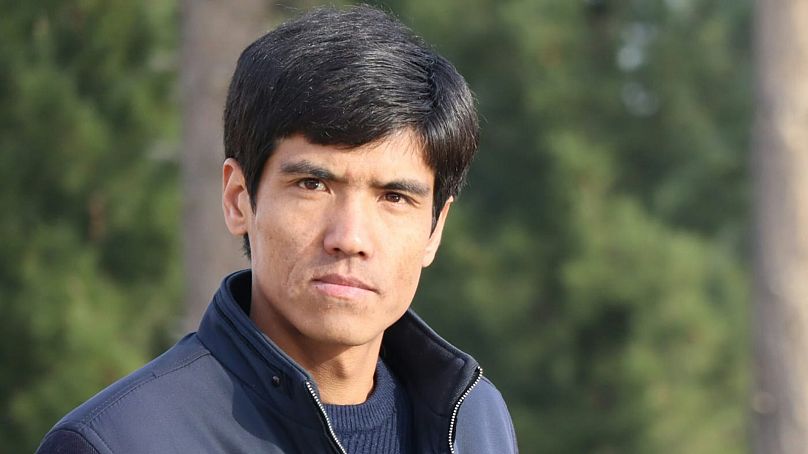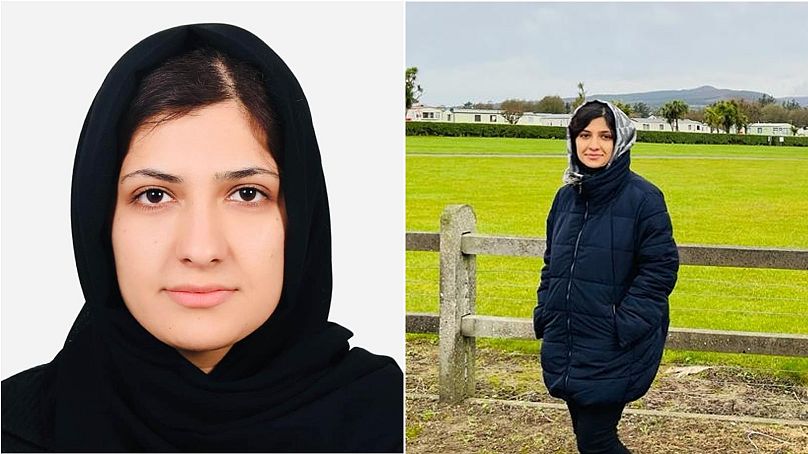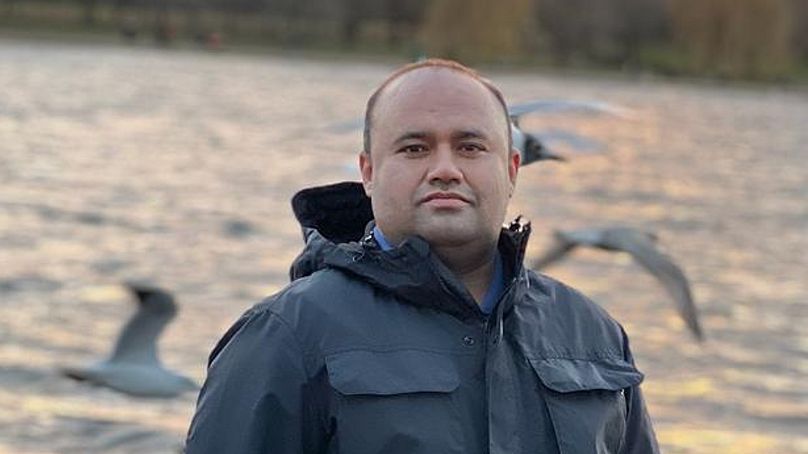It's six months since the Taliban swept back into power in Afghanistan, which, for some, prompted a frantic scramble to get out. We caught up with four Afghans who fled and made Europe their new home.
Six months on from the Taliban takeover of Afghanistan, we catch up with four Afghans who fled and have made Europe their new home.
Atefa, Reza, Zahra and Farid are among tens of thousands airlifted to Europe in the aftermath of 15 August 2021.
Many are trying to adapt to life in their corner of Europe, while at the same time worrying about those they left behind in Afghanistan.
Some of those who escaped fear reprisals against their families because of their collaboration with Western governments.
On top of that, there is a worsening humanitarian crisis developing, with Afghans suffering hunger amid an unforgiving winter.
The return of the Taliban drove billions of dollars in international aid out of the country, pushing an already poor and war-ravaged country further into trouble.
Atefa Hesary, France
Atefa Hesary worked as an artist for the Institut Français in Kabul until the Taliban takeover.
With help from the French government, she was evacuated 10 days later on a French military plane to Abu Dhabi.
She now lives in Montreuil -- in the suburbs of the French capital Paris -- where she is part of a collective for artists in exile.
“I’m continuing my exercises in theatre,” Hesary told Euronews. “The theatres in France are helping me.”
“French people are kind and love the arts,” she said.
But as the only member of her family living in France, life, she says, is not easy.
“I miss everything from Afghanistan, my family, my friends, the memories, the streets and everything everywhere,” she said.
“My body is here but my mind and my heart are still in Afghanistan," she added. "It’s difficult to leave your country, your homeland, your family and everything and come to a new country with a new language and new culture.”
The experience of Afghan asylum seekers in France has differed considerably depending on how they arrived in the country. Afghans who were airlifted from Kabul have had their claims fast-tracked while many of those who have reached Europe by overland – a long and dangerous trip – have ended-up homeless, living in makeshift camps.
“The worsening humanitarian situation in Afghanistan coincides with mounting threats to the right to asylum in Europe, including for Afghan nationals in need of protection,” Olivia Sundberg Diez, a policy and advocacy adviser for the International Rescue Committee, told The New Humanitarian.
Reza Omid, Germany
In Afghanistan, Reza Omid worked as a monitoring and evaluation officer for a German NGO.
The 29-year-old is a member of the minority Hazara community which were oppressed under the previous Taliban regime.
When the Taliban took over, his NGO arranged for asylum in Germany, but they did not have a chance to get evacuated by plane before the US withdrawal.
Instead, Omid and his wife had to pay a smuggler to help them get to Pakistan by land.
While being smuggled across multiple Taliban checkpoints on the route to Pakistan he wore a burka so that they would not be stopped at checkpoints.
“It was very dangerous,” he told Euronews.
They spent a month in Pakistan while they waited for the German embassy to issue them visas. They flew from Islamabad to Germany on 14 October.
Omid is currently living in Badan-Württermberg State.
“The most important thing is that I feel I feel safe,” he says. “I received a lot of respect, support and courage from German friends and people in different aspects of my new life.”
But there is still anxiety about life back home: his brother is a prominent civil rights activist and remains in Afghanistan.
“My focus is to advocate and try to save my brother who is in serious threat,” he said.
Around 20,000 Afghans are still waiting to be evacuated from Afghanistan to Germany, according to the Federal Office for Migration and Refugees. Many of them worked for German forces or agencies and are now at risk under the new Taliban regime.
"The new foreign minister is under an obligation here to offer clear and rapid assistance," says Gökay Akbulut, an MP from the Left party (Die Linke).
Zahra Haidari, Ireland
Zahra Haidari served as a judge in Kabul where she handled cases involving public security and corruption.
Her court was responsible for jailing several members of the Taliban and the Islamic State.
As the Taliban swept across the country, Haidari, who was pregnant, and her husband went into hiding in Balkh Province in northern Afghanistan.
The couple were evacuated to Greece with the support of the International Bar Association. In Greece, Irish authorities issued visas for the couple who arrived in Ireland at the beginning of December.
On arrival, they were provided with assistance from the Red Cross, as well as the Irish Bar Association and Law Society. The groups represent legal professionals in Ireland and offered assistance to a group of ten female Afghan judges.
Haidari and her husband spent two weeks in a hotel in Waterford before being provided accommodation in Dublin, where she gave birth to the couple’s first child in December.
She says the most important thing is that they are in “a safe and peaceful place” and adds that “Irish people are very kind and friendly”.
She would like to continue her work for justice in Ireland, whether as “a judge or solicitor or barrister or maybe in human rights and international law”.
But the rest of her family remain in Kabul and she is very concerned about the risk they face from her work as a judge.
Rory O’Neill, from the Irish Refugee Council, spoke to Euronews about the challenges facing newly arrived Afghans.
“Housing and access to independent living are the main issues that recently arrived Afghans are facing,” he said.
“The usual other barriers like language, employable skills and access to the labour market should not be as difficult, as most were in secure employment at a high level, prior to the changes.”
Farid Ahmad Rahmani, United Kingdom
Farid Ahmad Rahmani was serving as an interpreter at the British Embassy when the Taliban took Kabul last August.
Along with his wife and six children, he spent 19 hours waiting at Camp Baron, a military base used by coalition forces near Kabul Airport.
“People were stampeding,” he told Euronews. “Everyone wanted to get into the camp. It was really horrible.”
The family were then flown by a Blackhawk helicopter to Kabul Airport, where they waited and finally boarded a UK military flight to Dubai. They then flew to Birmingham and from there were transferred to Manchester to undertake a two-week quarantine.
Since then, his family have been staying at a hotel in Watford, outside of London while they wait for permanent accommodation to become available. His children have started at local schools – “they were excited on their first day.”
“I found English people very generous,” says Rahmani. “When we left Afghanistan, we could not bring anything with ourselves and since we arrived, they have helped us with everything we need.”
He misses his family who is still in Afghanistan including his mum and his sister and where the sudden withdrawal of Western funding has led to mass hunger. “I was the only one helping them with their expenses,” says Rahmani.
Every weekday, Uncovering Europe brings you a European story that goes beyond the headlines. Download the Euronews app to get a daily alert for this and other breaking news notifications. It's available on Apple and Android devices.















